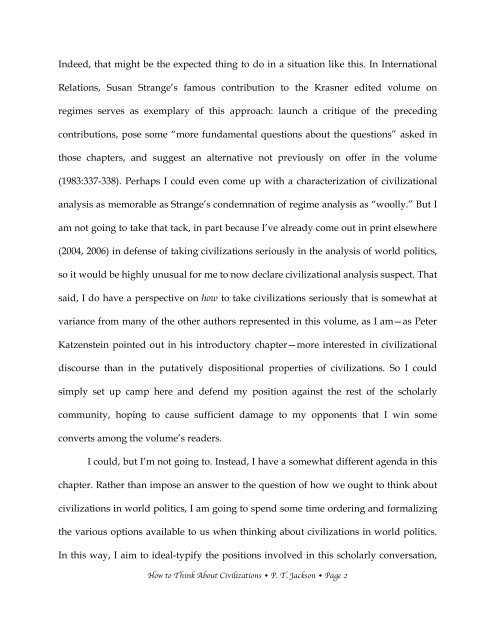How to Think About Civilizations - The Watson Institute for ...
How to Think About Civilizations - The Watson Institute for ...
How to Think About Civilizations - The Watson Institute for ...
Create successful ePaper yourself
Turn your PDF publications into a flip-book with our unique Google optimized e-Paper software.
Indeed, that might be the expected thing <strong>to</strong> do in a situation like this. In International<br />
Relations, Susan Strange’s famous contribution <strong>to</strong> the Krasner edited volume on<br />
regimes serves as exemplary of this approach: launch a critique of the preceding<br />
contributions, pose some “more fundamental questions about the questions” asked in<br />
those chapters, and suggest an alternative not previously on offer in the volume<br />
(1983:337-338). Perhaps I could even come up with a characterization of civilizational<br />
analysis as memorable as Strange’s condemnation of regime analysis as “woolly.” But I<br />
am not going <strong>to</strong> take that tack, in part because I’ve already come out in print elsewhere<br />
(2004, 2006) in defense of taking civilizations seriously in the analysis of world politics,<br />
so it would be highly unusual <strong>for</strong> me <strong>to</strong> now declare civilizational analysis suspect. That<br />
said, I do have a perspective on how <strong>to</strong> take civilizations seriously that is somewhat at<br />
variance from many of the other authors represented in this volume, as I am—as Peter<br />
Katzenstein pointed out in his introduc<strong>to</strong>ry chapter—more interested in civilizational<br />
discourse than in the putatively dispositional properties of civilizations. So I could<br />
simply set up camp here and defend my position against the rest of the scholarly<br />
community, hoping <strong>to</strong> cause sufficient damage <strong>to</strong> my opponents that I win some<br />
converts among the volume’s readers.<br />
I could, but I’m not going <strong>to</strong>. Instead, I have a somewhat different agenda in this<br />
chapter. Rather than impose an answer <strong>to</strong> the question of how we ought <strong>to</strong> think about<br />
civilizations in world politics, I am going <strong>to</strong> spend some time ordering and <strong>for</strong>malizing<br />
the various options available <strong>to</strong> us when thinking about civilizations in world politics.<br />
In this way, I aim <strong>to</strong> ideal-typify the positions involved in this scholarly conversation,<br />
<strong>How</strong> <strong>to</strong> <strong>Think</strong> <strong>About</strong> <strong>Civilizations</strong> • P. T. Jackson • Page 2
















